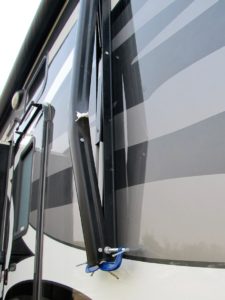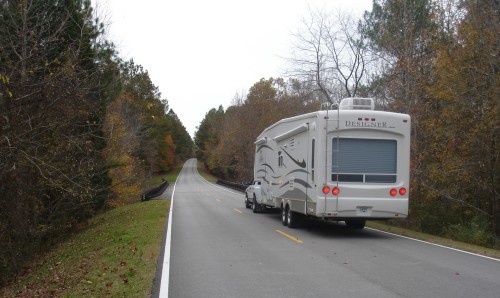
Mice are nice … outside!
What’s the dumbest thing you’ve done while RVing?
In several of last year’s Awards, well-meaning folks were engaged in friendly conversation with RV’ers who were driving through a crowded parking lot, departing a campsite, or hooking up a trailer, causing some serious damage. Their friendly interactions lead to the RVers being distracted at exactly the wrong time, when focus was required to complete a task.
Two of this year’s mishaps illustrate another concern with well-meaning folks – their helpful actions actually caused the mishaps. I saved them for last in our list of 10 Dumb to Dumbest things because … they are pretty dumb!
DUMB THINGS
No. 10 Mice are nice … outside One of our camping neighbours had left his motorhome for a few weeks in the fall. Upon his return, mouse droppings were scattered throughout his living areas, and some of his water lines were chewed through. Fortunately, he had turned off his outside tap.
Ron assumed mice had entered through a port where his water hose came into a utility compartment. From there, they likely crawled into the basement and found their way into the salon.
After vacuuming up the droppings and repairing the damaged water lines, Ron set traps, catching two little critters, which he released – outside.
Helpful hint: Check for small openings under your coach, especially where the water hose and TV cables enter. Mice can enter through an opening as small as ¼ inch, about the size of a pencil eraser. Pack the openings tightly with steel wool and spray with a mixture of peppermint oil and water, a proven mouse-repellant.
No. 9 Black-water shower Jim and his wife had been boondocking in their Class-C for a couple of days before arriving at an RV Park. Friends had invited them to dinner, so they immediately spruced up upon arrival. Since he had some time before dinner, Jim decided to hook up the sewer hose to drain the black and gray water tanks. He got out the hose and inserted one end into the sewer drain. Holding the other end, he rotated the cap from the discharge pipe. WOOSH! Black water shot out all over Jim, who didn’t even try to attach the hose until the gusher decreased to a dribble. He sheepishly admitted he “forgot to close the black-water valve while they were dry camping” … and added “we were late for dinner!”
Helpful hint: In addition to a black-water valve, it’s prudent to have a separate gate-valve at the end of the discharge pipe, which is kept closed when boondocking and in transit.
No. 8 Step lightly Night had fallen in the campground when Linda decided to leave the coach to bring in their tablecloth from the picnic table. Outside was pitch dark, as she did not want to attract moths to their door light. The step switch was set so that the steps would extend when the door opens and retract when the door closes. It always worked that way, until that night. Linda opened the door and stepped down … and further down until she landed hard on the ground. Fortunately, her only injury was a bruised ankle, which took the brunt of the fall. The steps had remained retracted.
A local RV-repair shop replaced a faulty door switch. Even though the steps now extend reliably when the door is opened, Linda follows the advice in the Instruction Manual: “Always look down to make sure the steps are extended before stepping out.”
No. 7 Best before date Alf was driving his Class-A along a freeway when BOOM, the sound of a cannon reverberated in the back of his coach. Pulling over, he found that one rear tire had exploded, throwing a chunk of rubber through the wheel well, damaging an interior cabinet. With his flashers on, he drove slowly to the nearest tire shop, where the salesman recommended he replace all six tires. “Why all six, the tread is like new?” Alf asked. “Because they are 10 years old. Most tire manufacturers recommend changing them after 6 or 7 years, regardless of tread wear.”
Alf occasionally checked his tires for inflation, cracks, and tread wear but never for age. He assumed that by using his motorhome only during the summer months, his tires should last longer. Not so, he learned from the salesman, “Tires which sit for extended periods, especially on damp ground and in direct sunlight, will deteriorate quicker than those used regularly.”
Helpful hint: A tire’s age can be determined by the last 4 digits of the DOT code, for example: 4216. The first two digits refer to the week of manufacture and the last two digits refer to the year … 42nd week of 2016.
No. 6 Fill ‘er up When Fred decided to give up RVing, he sold his diesel pusher to a man who had described himself as a long-haul trucker. Following the transaction, he spent a couple of hours explaining all the systems. A few days later, Fred got a call from the buyer who said the coach had stalled. After some discussion, the reason became painfully clear: the buyer had put gasoline in the fuel tank. Perhaps the trucker got distracted at the fuel pump at exactly the wrong time?
Fred didn’t know the extent of damages, and he certainly didn’t think it was necessary to tell a trucker to put diesel in the fuel tank. Diesel fuel, unlike gasoline, acts as a lubricant for the fuel-injection system. Running a diesel engine on gasoline will cause the fuel pump to overheat and damage the fuel injection system.
Surprisingly, no standard exists for the colors used on pump handles at fuel stations; however, diesel handles are usually green, yellow, or black. If your engine is diesel, your fuel cap should be labeled “DIESEL” as a reminder to check the pump before adding fuel.
DUMBER THINGS
No. 5 Blown with the wind Jack and his wife were offered the use of his brother’s motorhome for a camping trip in the Palm Springs area. Since they were novice RVers, Jack’s brother carefully went through all the systems, including how to manually extend and retract the awning. Off they went for a week of camping, with Jack driving the motorhome and his wife following in their car.
Arriving at their campsite on a sunny day, Jack decided to extend the awning to provide shade while they had dinner. Near the end of the week, with the awning still extended, they headed out in their car on a site-seeing trip. While gone, the wind picked up … really picked up!
 When they returned, much to their horror, their awning with bent braces was upside down on the roof. Jack got some fellow campers to help him get it back down and secured to the side.
When they returned, much to their horror, their awning with bent braces was upside down on the roof. Jack got some fellow campers to help him get it back down and secured to the side.
To make things right with his brother, he arranged with an RV dealer to install a completely new awning at a cost of $800, which his brother agreed to share because he neglected to tell Jack to secure or retract the awning when leaving the campground.
Helpful hint: Awnings are very susceptible to wind damage. If they are not well secured with ground straps, always retract them when leaving the campsite for more than a few hours, especially in potentially high-wind locals.
No. 4 Things that go bump in the night Greg’s relatively new Class-A had a large awning, which automatically retracted when it got windy. An anemometer (wind speed indicator), mounted on a pole attached to the roof, sent a signal to the awning motor if the wind speed exceeded a preset value. Greg said he enjoyed this feature if the wind picked up when he wasn’t around, but not so much when he was barbequing under the awning on a rainy day!
On one of their frequent trips to a State Park for a weekend of relaxation, he and his wife arrived just after dark and chose a campsite, which looked suitable for their coach. With his wife as a spotter at the rear, he backed into the site. Just as he cleared the road, they both heard a CLUNK sound coming from the roof. Looking up, they saw a low tree branch touching the roof, which they assumed had collided with their air conditioner. No worries, Greg said he would check it in the morning.
Later that night, it started raining. By morning, water was dripping from several ceiling lights in the salon and bedroom. To protect the carpets, they put pans under the drips and emptied them regularly … hardly the relaxing weekend they had anticipated. When the rain finally stopped in late afternoon, Greg climbed up on the roof and saw that the low branch had knocked down his anemometer pole leaving a depression and a hole in the roof. Rain had collected in the depression and ran through the hole onto the ceiling of their coach.
After covering the hole with duct tape, they packed up and returned home. Their RV Dealer reattached the anemometer and replaced the entire ceiling, which was costly but covered by insurance since the loss was “sudden and accidental.”
Helpful hint: A spotter should look up as well as on the sides and back of the rig to ensure adequate clearance when backing into a campsite. Low branches are especially problematic in smaller and more primitive campgrounds such as State Parks
No. 3 Such a deal An elderly gentleman had been living for many years in his older Class-A at a Florida RV resort. Unfortunately, because of ill health he had to be admitted to a long-term care facility. He asked his neighbour Jeff, a Snowbird who rented a park model annually, “If you want my coach, you can have it for a dollar, provided you remove it from the site within a week.” Although the engine wouldn’t start, “it seemed like such a deal,” that Jeff couldn’t pass it up. For $500, he had it towed to a storage lot, where it remained until the following season.
When Jeff returned south in the fall, he had the motorhome towed to an RV-repair shop. Much to his dismay, it needed major repairs: engine, transmission, brakes, exhaust system, tires, batteries, and the list went on, adding over 30 Grand to the one-dollar motorhome. After rebuilding his motorhome to a roadworthy condition, Jeff’s limited finances prevented him from fulfilling his dream of “hitting the road.” In the end, he was forced to sell it – at a considerable loss.
Helpful hint: If you’re thinking of buying an RV at a price that’s too good to be true, it probably is!
For the first time in the history of this column, each of our final two awards are rightfully shared between two people – the RVer who reported the mishap and the unwitting friend who caused it. Drum roll please!
No. 2 A partial hookup Getting ready to depart a campground in his coach, Paul was hooking up the tow car when his neighbour Ed offered assistance. As Paul was putting in the left tow-bar pin and hooking up the cables, Ed inserted the right pin.
About 100 miles down the road, all appeared fine until he crossed a very rough, narrow bridge. Immediately afterwards, he glanced in the right-side mirror and noticed that his car was riding on the shoulder, as if attempting to pass. Carefully stopping, he went back to discover that the right pin was gone, most likely because Ed had not pushed it all the way in until it locked.
Paul remarked: “thinking back on the bridge crossing, if my car had been off to the side just before the bridge, it probably would have climbed the guardrail and landed in the river, not to mention other possible damages to my motorhome.” A scary thought indeed! Fortunately, he was able to obtain a hitch pin nearby and was soon back on the road with his car safely attached behind.
Paul learned a valuable lesson: “Don’t accept help with departure duties from anyone without checking on their work.”
DUMBEST THING
No. 1 Water woes While at a campground in his Class-B, Rick’s kitchen faucet stopped flowing. In the process of trying to diagnose the problem, an impromptu group excursion came up with some camping buddies and he decided to go along. When he got back and opened the door, a flood of water came cascading out. His dog was standing on the dinette table; no doubt thankful he didn’t have to doggy paddle until his rescue. Rick had left the faucet open and it never occurred to him to take the stopper out of the sink, “since there was no water flowing.”
Rick shut off the tap at the campground hookup and mopped up the water; then he left to “blow off some steam” with his buddies. Another friend, who saw Rick turn off the outside tap, thought he would be helpful by turning it back on. Several hours later, Rick returned and opened the door to another cascade of water! He had again left the faucet open with the stopper still in the sink, “since there was no water flowing!”
Apparently, a piece of plastic had become lodged in the faucet shutting off the water. For some unknown reason it shifted, allowing water to resume flowing. Rick said, “I will never ever leave the stopper in my sink again, except to do the dishes.”
Two floods in one day – with a little help from a friend – definitely warrants our top Award for this year!
These last two awards illustrate that many of the friendly folks we meet along the way are more than willing to lend a helping hand. Ultimately of course, responsibility for successful outcomes rests with the RVer who accepts help – which means, it’s always a good idea to check that the job was done properly.
The author thanks all of this year’s winners for sharing your stories so that others can benefit from your mistakes. And now for the moment of truth! Whether you’re a novice or a seasoned roadie, think back over your RVing history. Have you ever done something dumb that you wish you hadn’t? Be honest … almost everyone I ask comes up with something! Feel free to share your story with me by email ([email protected]) and I’ll try to include it in next year’s RV OOPS Awards.
